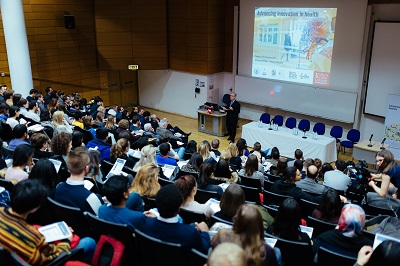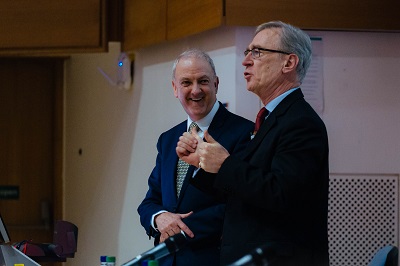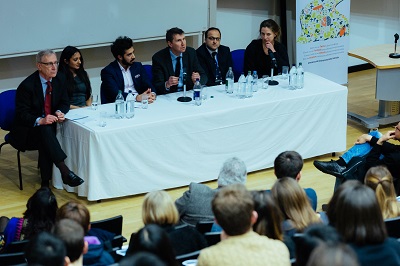The Entrepreneurship Institute and health faculties join together to advance innovation in health
On Tuesday 28th February over 300 students came together to learn about the important role innovation and entrepreneurship play in tackling the challenges currently faced by the health industry.

'Advancing innovation in health’ organised by the Entrepreneurship Institute and King's student health societies, was hosted by Professor Sir Robert Lechler, Vice-Principal of Health, and included Sir Bruce Keogh KBE, National Medical Director for National Health Service England, as a special guest speaker.
Upon arrival, the audience were given the opportunity to have their say on the biggest challenges in health, by voting for the one they felt most passionately about. From a choice of 10 challenges, the top three, announced at the end of the evening, were the obesity and child obesity pandemic, antimicrobial resistance and diabetes.
Professor Lechler introduced the event by speaking about King’s agenda on health innovation and explained how the Entrepreneurship Institute can help develop the skills needed to create health innovation. Speaking of the event, Professor Lechler, said: ‘Never has healthcare needed more innovation than it does now to meet the challenges of today and I think the prospect of unleashing the imagination and energy of our students to bring to bear on some of these real challenges is very, very exciting.’

Sir Bruce Keogh was welcomed onto the stage to discuss the past, present and future of innovation in health. While acknowledging that spreading innovation across the whole of the NHS is a difficult challenge, he explained that the NHS has started a Clinical Entrepreneur Programme, NHS Digital are currently working on Skype consultations and the NHS is using ‘combinatorial’ innovation that integrates new technologies and other novel approaches.
Sir Keogh ended on an optimistic note, giving advice on how students and health professionals can steer change in health innovation and explaining the importance of recognising that there is no hierarchy for good ideas.
After an inspiring talk from Sir Keogh, Professor Lechler introduced five health professionals from King’s who each showcased their experiences with innovation in health.
First up was Tom Carell, whose current posts include Consultant vascular and endovascular surgeon, Guys' and St Thomas' NHS Foundation Trust; Clinical lead for complex aortic surgery, King's Health Partners; and Reader, Imaging Sciences, King's College London. Tom co-founded Cydar with Dr Graeme Penney, Senior Lecturer in Imaging Sciences in the Department of Biomedical Engineering at King’s. Cydar uses cloud high-performance computing and artificial intelligence to revolutionize surgical guidance.

Next was Pankaj Chandak, Alumnus and Specialist Registrar in Transplant Surgery at Guy’s, St Thomas’ and Great Ormond Street Hospitals and Royal College of Surgeons of England Research Fellow within the MRC Centre for Transplantation, King’s College London. He spoke about his multidisciplinary work on integrating 3D printing into complex paediatric transplantation. The work which was a world-first was awarded The Royal Society of Medicine Norman Tanner Medal 2016 and the prestigious Worshipful Company of Cutlers’ Clarke Medal and Prize for Innovation, 2016.
The third speaker was Bhavagaya Bakshi who studied Medicine at King’s and graduated in 2011. During her GP training, Bhavagaya experienced first-hand the difficulty doctors face in detecting cancer early. She co-founded Project Medicine with the vision to deliver creative and novel solutions to healthcare challenges and with her team she has developed a digital tool which uses evidence based algorithms to identify patients with a suspected diagnosis of cancer.
Dr Faheem Ahmed was the next speaker. Dr. Ahmed is a King's Alumnus, who completed his undergraduate medical training at Guy’s, King’s and St Thomas’ Hospitals. He is a founding member and director of Selfless; co-founder of Health Make Space (supported by the Entrepreneurship Institute's King's20 accelerator); the UK faculty lead at the Institute for Healthcare Improvement and the first foundation doctor to be appointed as a National Clinical Entrepreneur Fellow. Dr Ahmed discussed Health Make Space, a digital collaboration platform, which allows healthcare students and professionals to connect with start-ups.
Dr Katy Kuhrt, Alumna, was the final speaker to showcase her work. She is a research fellow for Professor Andrew Shennan at the Women’s Health Academic Centre at King’s. Dr Kuhrt co-founded QUiPP, an app which helps to predict spontaneous preterm birth. The app is being used globally in Preterm Surveillance Clinics and has won innovation awards from Health Service Journal and the Entrepreneurship Institute.
The five professionals then took part in a Q&A, giving the audience a chance to hear some more on their experiences and views on health innovation. A range of subjects were touched upon including public distrust in sharing health data and the extent to which the elderly would be keen to engage with new health technology.
This was followed by a networking reception where students and innovators could discuss their ideas.
The event will be followed by a 'CreateAthon' next month, led by King's student health societies (pictured) where students will come together to try and find innovative solutions to the top 3 health challenges.

See photos from the event